I planned my funeral but new surgery means I'm cancer-free
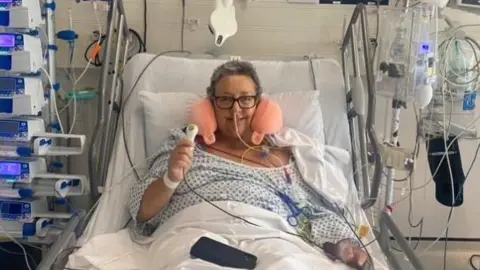 Victoria Reitze
Victoria ReitzeTwo years ago, Victoria Reitze was planning her own funeral.
Diagnosed with stage 4 colon cancer, which had spread to her ovaries, liver and peritoneum, she was told palliative chemotherapy might extend her life by a year.
But two-year funding for a new type of surgery in Wales - which until that point was only available elsewhere in the UK - means she is now cancer-free.
"At that time they had funding for 15 patients and I was patient number 13," said Ms Reitze, who said she had "survivor's guilt".
With funding for the surgery in Wales soon to run out, Ms Reitze has urged the Welsh government and NHS Wales to permanently resource the procedure.
The Welsh government said clinicians could make individual requests for "procedures that are not routinely available".
The surgery which Ms Reitze benefited from is for patients with advanced bowel cancer which has spread to the peritoneum, or lining of the abdomen.
Moondance Cancer Initiative, a not-for-profit company which works with the NHS in Wales to find new solutions to cancer treatment, paid for two surgeons to be trained at a centre of excellence in Basingstoke, Hampshire, before an all-Wales service was established in Cardiff in May 2022.
Since then, it has treated more than 40 patients, including Victoria.
"When they [initially] told me it was just palliative chemo available to me, I had to put my end-of-life plan in place," said Ms Reitze, 55, from Barry, in the Vale of Glamorgan.
"We had to decide where I was going to die. I was going to have a living wake because I thought nobody's going to have a party without me," she said.
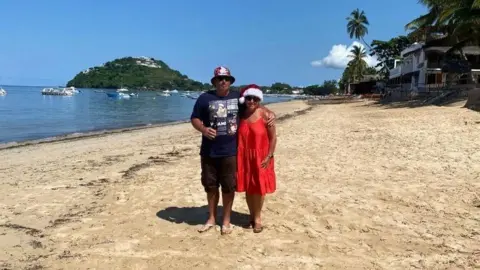 Victoria Reitze
Victoria ReitzeMs Reitze underwent eight rounds of chemotherapy, which reduced the disease to the extent that she became eligible for the newly available surgery.
"It was touch and go whether I was going to be chosen for the surgery," she said.
"It's that rollercoaster of emotions that you've gone through, planning your death, sorting out your finances, and then somebody's throwing you this lifeline."
In June 2023 she had surgery to remove a number of organs, including more than half her liver. Six weeks later she had the surgery where affected organs were taken.
For Victoria that meant a full hysterectomy, losing part of her colon, bladder and ureter, followed by a "hot wash" of chemotherapy to target any residual cancer cells.
"It was over a 10-hour operation and was gruelling - I understand why there's strict criteria, because it's not just the physical side, it's the mental side as well," she said.
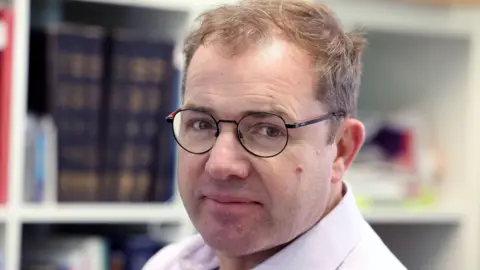 Moondance Cancer Initiative
Moondance Cancer InitiativeWhen the current funding expires in May, the surgery will still be available to qualifying patients in the Cardiff and Vale health board area, where the surgical team is based.
But a bid has been submitted to health bosses to secure longer-term funding to continue the all-Wales service.
Prof Jared Torkington, colorectal surgeon and clinical director of Moondance, said he wanted the Welsh government and NHS Wales to "help us work out a long-term funding strategy".
"What we're asking is for NHS Wales to accept that we've got life-saving treatment available for patients in Wales," he said.
Previously, patients in Wales could apply for the surgery to be done in England, but Prof Torkington said they had "pretty universally been turned down".
He said an independent cost analysis showed having surgeons trained in Wales meant "we were able to do probably three times as many patients for the same price it would cost Welsh government and NHS Wales to send these patients to England".
There are currently five centres in England providing the surgery, as well as centres in Scotland and Ireland.
"Wales has been an outlier with no [permanent] centre for a long time now," Prof Torkington added.
"Like all treatments, it doesn't always work and isn't suitable for the entire cohort of these people, but for those it is suitable for, it's always done to try and cure them," he said.
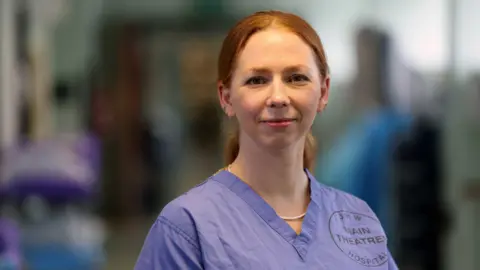 Moondance Cancer Initiative
Moondance Cancer InitiativeThe clinical lead for the new service, Jody Parker, said the extent of the surgery required depended on the spread of the disease.
"We've had patients in their 40s with young children and I think our oldest patient so far was 79 - but we'll consider all ages, because it's based more on fitness and the disease," she said.
She added that even those patients who were not eligible were grateful to have had their case considered.
"To know that you've done everything possible, especially as a young patient with a job, a family - exploring all options is crucial not only for you but the wider family circle."
Ms Reitz said she had "survivor's guilt" knowing so many others in Wales had not have been able to have the surgery which had saved her life.
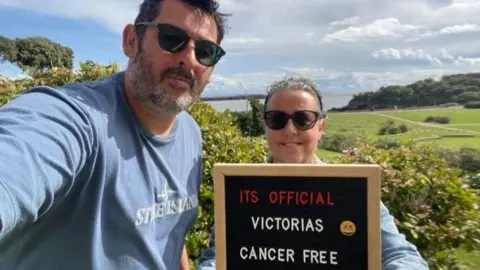 Victoria Reitze
Victoria ReitzeShe and her husband love to travel and, at the time of speaking to BBC News, they were on holiday in Goa.
"I'm not the same person because I'm still limited with my mobility," she said.
"But we sat on the beach last night watching the sun go down - we never thought we'd see this again.
"It's given us a life back. It's a different life, and a new normal, but it's a small price to pay to be alive."
A Welsh government spokesperson said: "We expect the NHS in Wales to commission treatment for cancer in line with guidance from the National Institute for Health and Care Excellence.
"For procedures that are not routinely available clinicians can make an Individual Patient Funding Request."
BBC Wales has approached the joint commissioning committee, who make decisions on funding, for comment.
